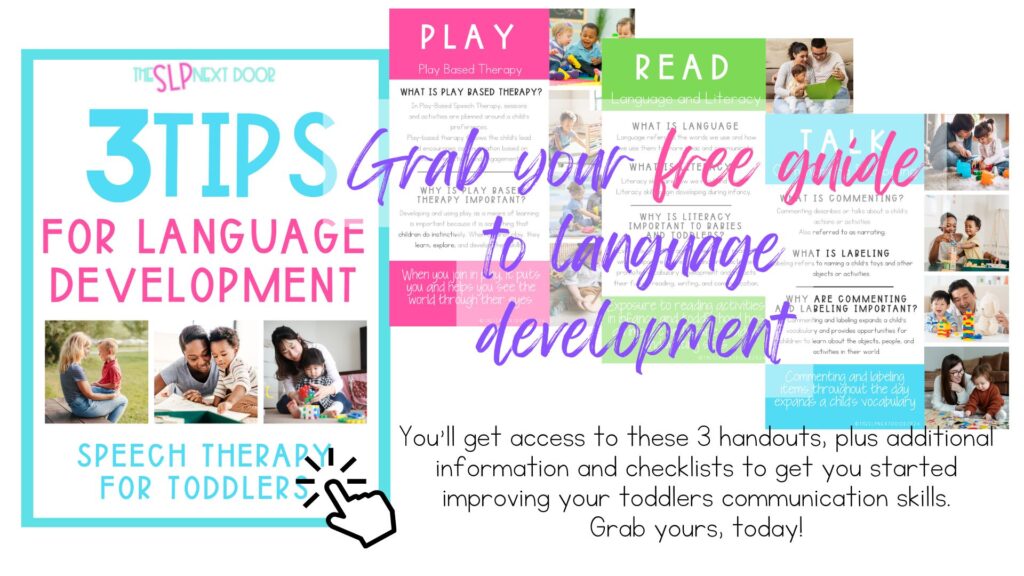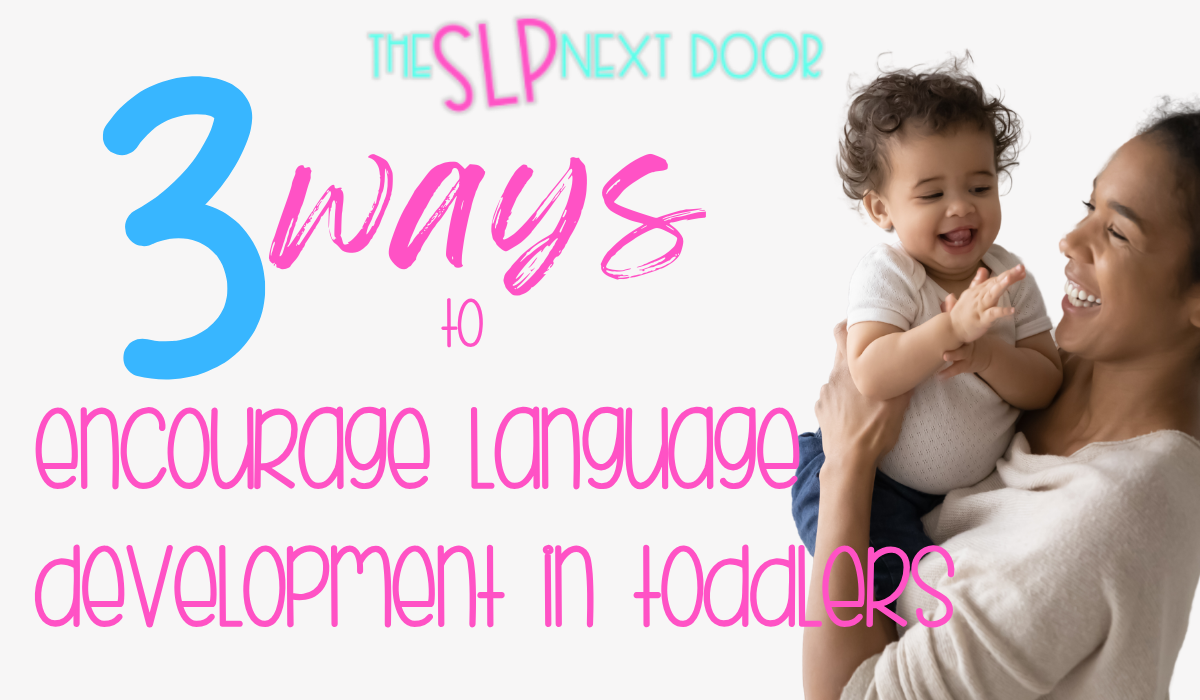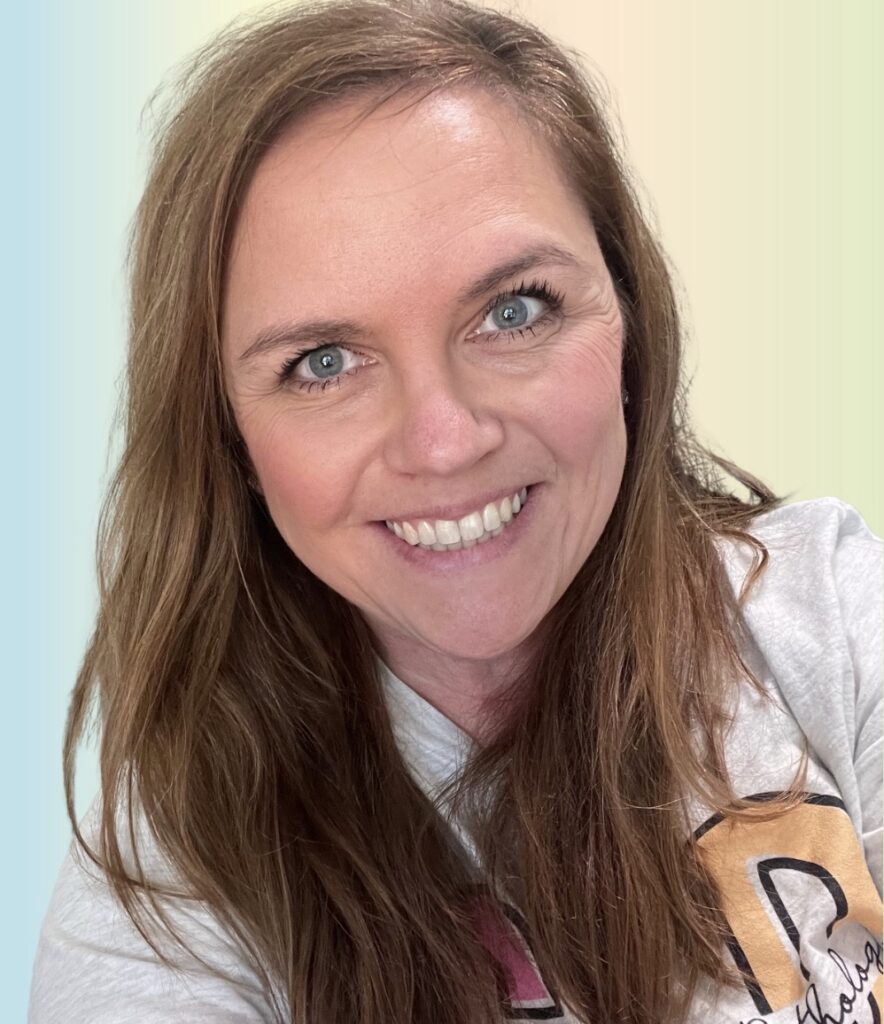Before we encourage language development and speech therapy for toddlers, we need to shift our mindset. It’s important to remember that toddlers are not preschoolers, school-age children, or infants. So we can treat them as though they are.
When I first started working with toddlers, I set myself (and the toddlers) up for failure every session. I was asking them to do tasks beyond their current developmental abilities. At one point, I even questioned my abilities as a SLP! It was hard not seeing the progress I expected, the toddlers weren’t paying attention to tasks, and, probably the most daunting… answering parent questions.
Please note: in this blog post, I am discussing toddler development from the perspective of language delays. It’s important to remember that when a child exhibits multiple delays or disabilities development will look differently. However, each of these strategies discussed may be applied to all toddlers; they just might need to be tweaked a bit to fit a child’s specific needs.
Language Development in Infancy:
While there are definitely some correlations to language development in infancy and toddlerhood, there’s also some major differences! During infancy, babies will progress through the stages of babbling, begin to explore the world around them through movement, and develop the motor skills that allow them to walk, talk, and play!
Language Development in Toddlers
Once a child reaches toddlerhood, their development has taken on a whole new level. Not only are most toddlers upwardly mobile (hello running, bouncing, and climbing), they’re also becoming more skilled with communication. Toddlers will go from developing prelinguistic skills to producing single words and words in phrases and begin to transition into simple conversation. All the while, their cognitive skills, motor abilities, and social skills are beginning to take shape. It’s a lot of development happening at once…and not every toddler is transitioning through it the same way.

It’s been several years since that fateful day when I realized I was asking too much of my toddlers. Over the course of time, continuous research, and a lot of trial and error later… I’ve divided the ability to improve toddler language development (which, by the way also tends to improve their overall communication skills) into 3 categories.
Elements of each category can be implemented into everyday routines, work with most speech therapy goals, and are easy enough that parents can do it when you’re not there! They are perfect for encouraging language development in toddlers.
Talking to Toddlers
Reading with Toddlers
Playing with Toddlers
Talking to Toddlers
I used to tell people to “be the Morgan Freeman” of your child’s life. Morgan Freeman narrates a lot of documentaries and the actions that others are doing…but he can also be kind of monotone. I’m beginning to think a better way to describe it is to be the Mrs. Rachel of your child’s life. Be animated, exciting, engaging, and fun! It can feel really awkward at first, but the more you do it, the easier it gets!
Talking through activities exposes toddlers to different aspects of language and communication development: prosodic features, descriptors, expanding utterances, vocabulary recognition, and conversational exchange! Not to mention there are also major benefits for speech sound development. Encourage parents to talk to their toddlers and play using simple language and exciting or different voices.
Use simple language, prosody (intonation changes are important!), and functional vocabulary words that fit into a child’s daily routine (sometimes their called power words). For example: “go”, “in”, “out”, “up”, “eat”, “more”, “all-done”, “stop”, etc.
Reading with Toddlers
Reading activities are so important because they impact so many different areas of development. They don’t always look like sitting quietly together and reading a book- in fact, with toddlers, it will probably not look that way for a little while. Instead, reading activities are a perfect time to practice conversational exchanges, joint attention skills, pointing, vocabulary, and listening.
And what do all these concepts have in common? Building communication.
Reading with babies and toddlers is so dang important.
I love this topic so much that I’ve also written a blog series about it.
Why is play important?
What is play based learning? Play based learning is exactly what is sounds like; learning through play! Playing is the work of childhood and is one of the best ways to encourage language and communication development in toddlers.
For the sake of this blog post, I am going to talk about the developmental levels of play.
Developing and using play as a means of learning is important because it is something that toddlers are supposed to do instinctively. When toddlers play they learn, explore, and develop their skills. More importantly, when you join in a toddler’s play, it puts you and helps you see the world through their eyes.
Playing with toddlers is about following their lead, going where they go, and engaging in their world. You can read more about the developmental levels of play here!
These 3 categories: talking to toddlers, reading with toddlers, and playing with toddlers are broad and can encompass a ton of activities in a variety of settings. Most importantly, they are things that parents and caregivers are already doing! When it comes to encouraging toddler language development, we want to encourage parents and caregivers to build on the skills toddlers already have.



One Response